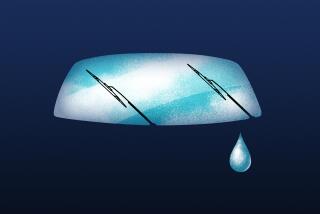Car Culture’s Excess Rolls Toward Oblivion
- Share via
Has the Hummer gone flat? Is the mobile icon of the born-to-drive, bigger-is-better American vehicle now the target du jour? So it would seem from recent news that the Hummer has dropped in popularity. As the company’s H2 continues its eight-month decline, is this symbol of the car culture’s excess beginning to pass into oblivion?
Demand is down, say Detroit’s Hummer builders, who are giving rebates on the once and former $50,000 kingpin vehicle. Meanwhile, sales of the green-is-good Toyota Prius hybrid rise. With six-to-12-month waiting lists for the high-mileage automobile, the questions arise: Has auto-snob appeal shuffled from “big is beautiful” to “clean is correct”?
Certainly, the fact that Prius sales are soaring and buyers are lining up suggests a change. Could this status slump compel shamed Hummer owners to hide their vehicles in the three-car garages of their McMansions?
In 1908, when Henry Ford’s Model T became the “machine for the masses,” prophets saw it as a tool to improve the nation, offer freedom to the farmer “stuck in the mud” and provide a better life to citizens suffering the waste and pollution of horse transportation. Unyoked by this new freedom, they would command their lives and landscape.
In time, however, the gains became losses; the car-as-tool was transformed into the car-as-trap. Advancing sprawl, squeezing pedestrian space, stripping streets of rails and funds for public transportation -- thereby depriving the old, the young and the poor of mobility, access and amenities -- the so-called vehicle of choice throttles our lives.
The romance of the road has become the reality of cars choked in traffic (8 billion hours a year, collectively), communities smothered in pollution and the nation’s fleet contributing 25% of global-warming emissions.
No wonder, then, that drivers and pundits alike worry as gas prices climb past $2.25 a gallon in some areas. Meanwhile, supplies shrink, and feeding our oil appetite becomes ever more precarious. No wonder the sticker-shock-sized Hummer has become not only a threat but a parody of the gluttonous American, losing his independence to drive free or die.
At the least it is a matter of sarcasm on the Sierra Club’s “hummerdinger” website, which includes parodies of the vehicle’s 16-foot parallel parking problem and a mock prize: “Boy Scout Buys Hummer: Earns Environmental Destruction Badge.”
Beyond the parody though, the decline in oil supplies and our latest war over oil now remind us that we must address the problem and pay the price for our pedal-to-the-metal lifestyle. We in the U.S. are recognizing that we need to lighten our automotive load and reduce consumption. Our 5% of the planet’s population owns close to half of its cars, carrying with that ownership planetary destruction to habitat and health.
Nearing the 100th anniversary of Henry Ford’s life-altering innovation, we have come to acknowledge that we must reduce our addiction “dependence” -- and its deadly consequences.
The realization has grown that we are stuck in traffic and overrunning our last-chance landscape with roads and cars that are the chief cause of land consumption, pollution and a lack of biodiversity. Add the ominous calculation that autos spew carbon dioxide gases that cause 25% of climate change, a figure that makes us fixate on super-conspicuous consumers. Also, there are 42,000 car-related fatalities a year.
When light-rail lines proceed in sprawling Phoenix; when rail comes to slowpoke Austin, Texas; and even cowboy-culture Houston joins Dallas, which keeps voting to fund new lines, the times they are a’changing.
As Los Angeles’ Union Station bustles with Metrolink and train traffic and mid-America Chicago pushes for a new commuter line to the northwest suburbs, these alternatives to car congestion seem more and more possible.
As for Hummer withdrawal? Those who mourn the loss of more automotive bang for the buck may still secure a metallic silver toy Hummer H2 at $19.95 for the asking, along with inscribed hats offering the sprawling name across the peak as a fond memory. The mini-version of the maxi-car goes on. But hurry while the stocks -- and the impulse -- last.






